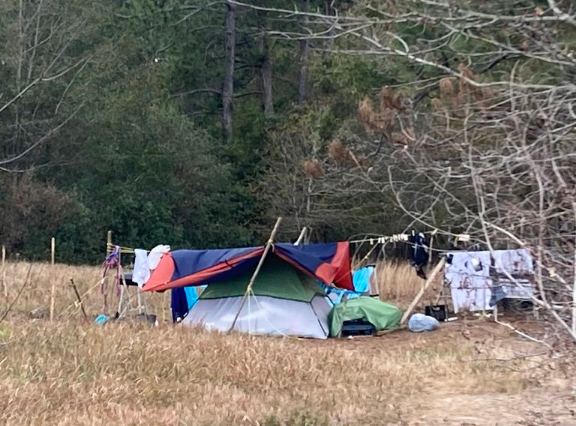A controversial camping ordinance that critics said was an attempt to criminalize Mobile's homeless community was introduced Tuesday.
Its sponsor vowed to bring it back again.
Councilman Ben Reynolds said he felt it "makes sense" to hold off on the vote for the proposed urban camping ordinance until "more clarity" on a number of questions.
They included:
- Where do the homeless go once they are pushed from a particular area to a camp?
- What is the bed capacity at shelters and other locations serving the homeless?
- How many service providers are there?
- What is the city planning to do with mental health issues?
"There are some questions unanswered at this point," Reynolds said. "We need to get some answers from them."
He said he plans to introduce a proposal in the coming weeks to "try and make sure we get the questions answered" so that the camping ordinance "doesn't get in the way."
'Morally unforgivable'
The ordinance, currently introduced, has been permanently removed from consideration, a group of advocates for the homeless hope.
The ordinance, first introduced in January, prohibits leaving or leaving unattended personal property -- bedrolls, clothing, backpacks, sleeping bags -- within the city of Mobile.
Violators can face fines ranging from $100 to $500 per violation, or up to six months in prison.
During Tuesday's council meeting, some advocates described the proposal as "morally unforgivable," "constitutionally dubious," and "adverse."
The Rev. Tony Elgood, pastor of the United Methodist Inner City Mission, also called it "biblical heresy."
"If we love our neighbors as we love ourselves, and when people suffer a disaster, whether natural or man-made, it will help bring them back," Algood said. "Or shall we put the money first?"
Elizabeth Chiplich, a social justice organizer and homelessness advocate for more than 20 years, said she believed the ordinance would have a negative impact on the city, increasing crime and causing a wave of despair among people living in homeless camps.
“Despair with mental illness and living outside in the sweltering heat of mobile and maybe an addiction, and this ordinance will push people already suffering over the edge,” Chiplich said.
She also said that Mobile, if it adopts the ordinance, would attract unwanted national attention and put the city in court to face lawsuits.
“It will draw more national attention to mobile and identify our city as another Alabama city that discriminates against the poor,” Chiplich said.
'Stay over it'
Reynolds, since he first introduced the ordinance two months ago, said it was not intended to punish the homeless. He said his intention was to address the litter being generated from the camps.
"I put forward this ordinance to address litter, public health, public safety and aesthetic concerns," Reynolds said. “There is still no solution for this. I don't intend to stop until we find solutions to those problems."
Some council members thanked Reynolds for introducing the ordinance and starting a citywide conversation about homelessness in mobile and reviewing the services that need to be addressed.
"I think it's good that we have these discussions," said councilwoman Gina Gregory. "It shows there is a need and we will stay on top of it."
In particular, the city's administration has noted that Mobile lacks a one-stop venue to assist in sending medical appointments and mail to the city's homeless population. One such location existed in Downtown Mobile and was operated by 15 Place, but has since closed.
Councilman William Carroll said he believed the city should "put some skin on the game" and help finance a similar space to serve the homeless population. He said the city has about $67 million in undisclosed reserves that could be used to aid a similar project.
Councilman Scott Jones said he believes addressing long-term mental health issues should be a priority, and is advocating that the city pay attention to how long-term mental health care centers need to be built. how it should be structured. He said the center should be similar to the long-closed Cersei Hospital in Mount Vernon.
Jones also said that there are people who are upset with the camp and litter who haven't "heard their voices" during the debate. Since January, no one has spoken at the council meeting, troubled by the homelessness and garbage.
"I've had those calls every week since it started, but no one has come here and grabbed a microphone (during a council meeting)," Jones said. “They too deserve to have their voices heard. At the end of the day, this ordinance has a place."
'Unconstitutional'
The ordinance has attracted the attention of civil rights organizations headed in recent weeks by the Montgomery-based Southern Poverty Law Center, the ACLU of Alabama, the National Homeless Law Center and the Poor People's Campaign: A National Call for Moral Revival.
Those groups claimed in a joint letter sent to city officials that the ordinance criminalized homelessness and could violate one's constitutional rights.
"The issue of evicting homeless people from publicly owned property is unconstitutional," said Chiplich. "It has played out well with the homeless community in the courts (across the country)."
Reynolds has said that his ordinance will only focus on a "narrow population" of people who are considered chronically homeless, which he estimates is about 200 people.
Official estimates suggest there are approximately 550–650 non-domesticated people in Mobile and Baldwin counties, although homeless service providers argue that the annual census count by Housing First Inc. is "dramatically low".
Those groups are estimated to total about 6,500 people.

